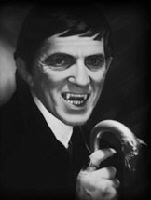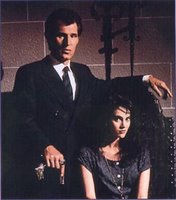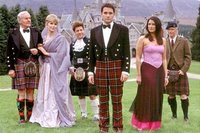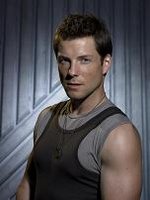
I was planning on writing this column for a while now but with the recent death of
Dark Shadows creator
Dan Curtis on Monday, I figured that now would be the best time to take a look back at one of television's most seminal shows,
Dark Shadows, and its many incarnations over the years. After all, what other television series can boast a long-running daily soap, a nighttime drama, two features, and a pilot among its checkered past?
I first discovered
Dark Shadows in its 1991 incarnation, a nighttime drama for NBC that had the unfortunate distinction of airing--and getting preempted--during the network coverage of the Gulf War. I immediately fell in love with the show and its blend of campy horror and soapy drama and set out to immerse myself in the show's lore, seeking out VHS tapes of the original serial from the 1960s and 1970s and scouring the bookstores for books about the series. And later, while watching
Buffy's resident vampire-with-a-soul Angel struggle with his quest to retain his humanity, I often thought back to
Dark Shadows' Barnabas Collins. (Hell, there are even echoes of
DS in Anne Rice's
Interview with the Vampire series... and CBS' now-cancelled drama
Forever Knight... the list of those influenced by the show goes on and on.)
For those of you not up to speed,
Dark Shadows (in all of its many incarnations) features the wealthy Collins family of fictional Collinsport, Maine, and the many secrets and mysteries that surround them. One of those figurative skeltons in the familial closet is that of one Barnabas Collins (played by Jonathan Frid, above, in the original and Ben Cross in the 1991 revival series), an ancestor of the present-day Collins family who arrives at their palatial manse, Collinwood, seemingly out of thin air... but he's actually a nearly 200 year-old vampire under a deadly curse. The series concerns itself with Barnabas' quest to restore his humanity, rekindle his love for the long-dead and now-reincarnated Josette du Pres, and keep his secret from those around him. Oh, and there's time travel, parallel universes, Lovecraftian invasions, reincarnation, seances, werewolves, and a whole slew of other supernatural or paranormal occurences.
The original
Dark Shadows series launched in 1966 on ABC as a daily, half-hour Gothic soap opera about strange goings-on at the Collins family estate in Maine. (It was a year until the show added what would become its vampiric lead, Barnabas Collins.) Young and inexperienced governess Victoria Winters (Alexandra Moltke) arrives at Collinwood to care for disturbed David Collins, a pre-teen expelled from his school after he burns it to the ground. Hired by David's father, the stern taskmaster Roger Collins (Louis Edmonds), and Roger's sister, sad, tragic Elizabeth Collins-Stoddard (Joan Bennett), Victoria is pretty much left to fend for herself as she gets herself entangled in a series of dangerous mysteries and eerie happenings. She's aided--and sometimes hindered--by Elizabeth's spunky daughter Carolyn (Nancy Barrett) and no-nonsense Maggie Evans (Kathryn Leigh Scott), a waitress at local hangout, the Blue Whale. What followed was the usual soap opera romances, betrayals, and intrigues, set against an imposing Gothic structure, but influenced by the Gothic storytelling of Ann Radcliffe, Mary Shelley, and others. That is until, Barnabas Collins (Jonathan Frid) was introduced...

Overnight, the show went from a Gothic-influenced soap opera to a supernatural one. No-good handyman Willie Loomis (John Karlen) inadvertantly frees vampire Barnabas Collins, who attacks him and then shows up at Collinwood claiming to be a distant relative of the family from England (no computers in those days to check his story, though the 1991 version doesn't address this either) and soon moves in to the property's Old Manor House, which he had once lived in when he was alive. He kidnaps Maggie Evans, whom he believes to be the reincarnation of his lost love Josette, attempts to hypnotize her and keeps her prisoner in the Old House's basement. Eventually with the help of the spirit of Barnabas' sister Sarah (a playmate of David Collins), Maggie is able to escape but remembers nothing of her ordeal.
A specialist is brought in to help Maggie recover her memory and a writer's typographical error changed the gender of this character from male to female. Dr. Julia Hoffman (Grayson Hall)--doctor, scientist, logician--is introduced. She quickly becomes Barnabas' adversary, but upon discovering his secret, attempts to cure him of his vampirism. Eventually, the two become companions in an unending quest to battle all manners of evil.
In a storyline crucial to the show's mythos, Victoria Winters is sent back in time to the year 1795, where she meets the flesh-and-blood Barnabas and his fiance Josette du Pres, the past self of Maggie Evans. There, Victoria spends many, many episodes attempting to get home while trying not to be hanged for witchcraft and ultimately falling in love with Peter Bradford (Roger Davis), the lawyer representing her. Meanwhile, the witch Angelique (Lara Parker, above) pulls all of the strings, evenutally cursing Barnabas (it's her fault he becomes a vampire) when he scorns her. Victoria returns to the present but, when she sees Peter Bradford on the side of the road, she crashes the car she's driving, which promptly removes her memories of Barnabas being a vampire.
Over the next few years,
Dark Shadows would get weirder and weirder, introducing malevolent spirits influenced by Henry James' classic ghost story "The Turn of the Screw," zombies, werewolves, disembodied magical hands, witches, warlocks, and ancient demons influenced by the Cthulhu stories of H.P. Lovecraft. It would also frequently send its characters through time using the
I Ching, to 1840 or the 1920s, always using its ensemble cast to play a wide array of period characters. Eventually the show began to explore the notion of parallel time--the thought that side-by-side with our own universe there exist an infinite number of alternate or parallel universes, similar to ours but with key differences.
While the parallel time idea was novel and interesting, ultimately the show, which soon left behind its primary characters--including Barnabas Collins, Victoria Winters, and Julia Hoffman--became a muddled alternate reality story, taking place in a parallel 19th century version of Collinwood. Longtime fans lost interest and
Dark Shadows swiftly ended production in 1971.
However, the series managed to give birth to two feature films,
House of Dark Shadows (1970) and
Night of Dark Shadows (1971), both of which were directed by creator Dan Curtis. The first film,
House of Dark Shadows, effectively reset the clock and showed an alternate universe version of the Barnabas origin story, as Willie Loomis frees Barnabas from his prison and sets him loose on a bloodbath in Collinsport. It was a much bloodier, darker, and violent incarnation of
Dark Shadows and portrayed Barnabas as much more malevolent character (the scene where he beats a defenseless Willie Loomis is as terrifying as it is heartbreaking), a portrayal that would greatly influence the later 1991 revival series, which drew greatly from the framework and tone of the film.
The second of the two
Dark Shadows films,
Night of Dark Shadows, departed even more from the storyline set out in the series. This time out, the plot was a reincarnation drama and revolved around a painter and his wife who move into yet another alternate reality Collinwood, only to find themselves plagued by ghosts of his ancestors. And when the husband becomes posessed by the spirit of his evil ancestor and keeps trying to murder his wife, all hell breaks loose. Unlike
House of Dark Shadows, which focused on the central character of Barnabas Collins, this film concerned itself with two popular supporting characters from the series (or alternate version of them anyway): Quentin Collins and Barnabas' nemesis, the witch Angelique. Fan favorite Grayson Hall (she played Dr. Julia Hoffman on the series) gives a memorable turn as the menacing Carlotta Drake, the Mrs. Danvers-like housekeeper.
Sadly, neither film is currently available on DVD, which is a shame because there is really nothing quite like them.

In 1991, NBC revived the long-dormant series, this time as a prime-time soap starring Ben Cross (left) as reluctant vampire Barnabas Collins and Joanna Going as ingenue Victoria Winters. This series only lasted 12 episodes (the Gulf War didn't help) and greatly compacted a number of storylines into its brief run: Barnabas' arrival; his sometimes adversarial relationship with Julia Hoffman (Barbara Steele); his romance with Victoria Winters (this time producers smartly made her Josette's reincarnation); and Victoria's journey to the 18th century where she comes face to face with Barnabas before his transformation into a vampire at the hands of Angelique. The series also updated or reinvented several of the characters. Dr. Julia Hoffman is, this time around, far more formidable and icy; wholly a woman of hard science not in touch with her own femininity. Maggie Evans, still a waitress at the Blue Whale, is now having an affair with the married Roger Collins and has psychic powers of her own such as clairvoyance and is a spirit medium. Carolyn Collins-Stoddard (Barbara Blackburn) is just as spoiled as her 1960s counterpart but is now overtly sexual; as much a predator in her own right as Barnabas. Jim Fyfe's Willie Loomis far more pathetic a creator than John Karlen's; he's introduced as a greedy, lazy alcoholic who frees Barnabas while looking for hidden jewels and then cowers in fear from his new master (the series uses the beating scene from
House of Dark Shadows), only to ultimately become Barnabas' trusted companion.
As previously mentioned, the 1991 revival series owes much of its darker elements to the
House of Dark Shadows film while still retaining some of the campiness of the original series (check out the "nighttime" scenes which are obviously filmed in broad daylight, the overwrought score, and the not-so special effects). Ben Cross' Barnabas is a much more violent, torn individual and his hungers weigh much more heavily upon him, as he cuts a deadly swath through both the town and the Collins family, attacking and killing Daphne Collins (Rebecca Staab)--whom he turns into a vampire and who attacks boyfriend Joe Haskell (Michael T. Weiss) in turn, murdering the suspicious Professor Woodard (Stefan Gierash) whom he turns as well, and viciously beating poor Willie.
As the police investigate the eerie deaths of a dozen individuals, they bring in a blood expert from New York University, one Dr. Julia Hoffman. Julia soon deduces Barnabas' secret, but rather than kill or expose him, offers to cure him in an ongoing experiment. She believes that his vampirism isn't a curse but rather a medical condition that can be cured. And they succeed for some time at keeping his vampirism in check, until Barnabas and Victoria get too close and a jealous Julia seeks to destroy the progress they've made. Barnabas soon transforms into a grotesque 200-year-old man and is forced to feed upon Carolyn when she discovers him. He vows revenge against Julia and sends Carolyn to kill her in bed but Julia is onto Barnabas and anticipates him. Their feud ends when Angelique reappears and when, during a seance to contact the ghostly Sarah Collins, Victoria Winters is sent back in time.
In a nice twist, the show catapults back and forth from Victoria in the year 1791--where she meets her past self, Josette du Pres, and Barnabas and is forced to witness tragedy upon tragedy happen to the Collins family, unable to stop them from happening--and the present day, where the Collins attempt to find a way to bring Victoria back. But Angelique (Lysette Anthony) has other ideas and is able to reach through the centuries to try and separate Barnabas and Victoria for good and end the Collins family. But then Victoria is able to save the Collins family and return to the present... and just like that the show ended as Victoria reappears in 1991, but armed with the knowledge that Barnabas is a vampire and responsible for the deaths of dozens of people. As a terrified Victoria looks at Barnabas, we fade to black as
Dark Shadows ends for a second time.
But it wasn't quite the end of the ongoing
Dark Shadows story. In 2004, the WB network filmed an aborted pilot for a new incarnation of
Dark Shadows, which never made it onto the air. This time, Barnabas was played by Alec Newman and Victoria by Marley Shelton. I managed to get a copy of the pilot script when it was in development at the WB and was saddened to learn that it was a jumble of storylines... the writers had managed to smoosh together several episodes' worth of stories into one confusing, underwhelming hour. I was hardly surprised that it didn't make it onto the fall 2004 schedule.
Which isn't to say that there won't be another attempt to revive the
Dark Shadows franchise in the future. This is, after all, a show--like Barnabas Collins himself--that refuses to die.
What’s On Tonight8 pm:
Out of Practice/
Courting Alex (CBS);
Deal or No Deal (NBC);
One Tree Hill (WB);
George Lopez/
Freddie (ABC);
Bones (FOX);
America's Next Top Model (UPN)
9 pm:
Criminal Minds (CBS);
Law & Order (NBC);
The Bedford Diaries (WB);
Lost (ABC);
American Idol/
Unan1mous (FOX);
Veronica Mars (UPN)
10 pm:
CSI: New York (CBS);
Heist (NBC);
The Evidence (ABC)
What I’ll Be WatchingLost.
As thought that's a surprise. On an all-new episode of
Lost ("Lockdown"), that old coot Locke has to enlist the aid of an unlikely ally when the hatch's blast doors come crashing down and the station takes on a life of its own. Could it be... creepy Other Henry Gale? And I've said it before but I'll say it again: Lockdown. Heh. Locke down.
Veronica Mars.
Meanwhile, over on a first run ep of
Veronica Mars ("The Rapes of Graff"), Veronica's ex-boyfriend is accused of date rape and turns to everyone's favorite teen sleuth to clear his name. Come on, Veronica, leave your former BF out to dry and focus on solving the mystery of the bus crash! Inquiring minds want to know!
























